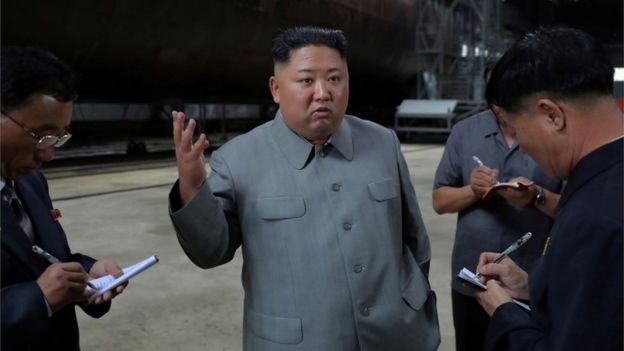
This article is more than
6 year old
The launches happened in an area on the country's eastern coast early on Friday.
They are seen as a reaction to planned military exercises between South Korea and the US due this month.
Meanwhile, the UK, France and Germany have called on North Korea to engage in "meaningful" talks with the US.
After a closed-door meeting at the UN Security Council, the countries said international sanctions need to be fully enforced until Pyongyang had dismantled its nuclear and ballistic missile programmes.
The launches happened at 02:59 (17:59 GMT Thursday) and 03:23 local time from the Yonghung area in South Hamgyong province into the Sea of Japan, also known as the East Sea, according to South Korea's Joint Chiefs of Staff (JCS).
The area appears to be a launch site that has not been used before, said Ankit Panda, adjunct senior fellow at the Federation of American Scientists.
"Another theme of the Kim Jong-un era in addition to frequent night-time launching: launching from previously unused/less-used sites."
Speaking at the White House, US President Donald Trump said he was not worried with the recent launches as they were short-range missiles and "very standard".
On Wednesday, the North launched two missiles that flew 250km (155 miles) and reached a height of 30km before landing in the Sea of Japan, also known as the East Sea, according to South Korea.
The South identified the missiles as a different type from previous models. But on Thursday, Pyongyang gave a different assessment, saying it had tested a new rocket launcher system, without providing details.
On 25 July, the North had fired two other missiles, one of which travelled about 690km.
That launch was the first since Mr Trump and North Korean leader Kim Jong-un held an impromptu meeting in June at the demilitarised zone (DMZ), an area that divides the two Koreas, where they agreed to restart denuclearisation talks.
North Korea has recently again voiced anger over planned US-South Korea exercises, an annual event which the allies have refused to cancel but have scaled back significantly.
North Korea sees the drills as preparation for war and has called them a "violation of the spirit" of the joint statement signed by Mr Trump and Mr Kim at their first face-to-face talks in Singapore last year.
Pyongyang had warned the exercises could affect the resumption of denuclearisation talks.
US Secretary of State Mike Pompeo said on Monday that he hoped these talks could start "very soon", but that there were no further summits planned.
Last year, Mr Kim said North Korea would stop nuclear testing and would no longer launch intercontinental ballistic missiles.
Nuclear activity appears to be continuing, however, and satellite images of North Korea's main nuclear site last month showed movement, suggesting the country could be reprocessing radioactive material into bomb fuel.

Pyongyang also continues to demonstrate its abilities to develop new weapons despite strict economic sanctions.
It conducted a similar short-range missile launch earlier in May, its first such test since its intercontinental ballistic missile launch in 2017.
North Korea also showed off a new submarine last week, which South Korean officials have determined is capable of carrying up to three ballistic missiles.